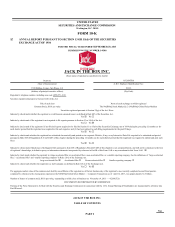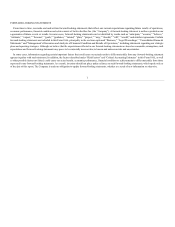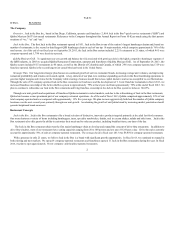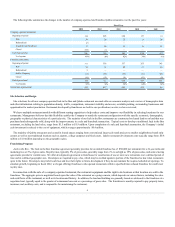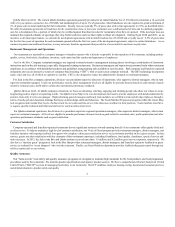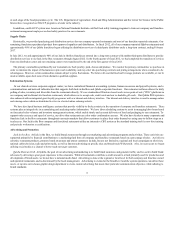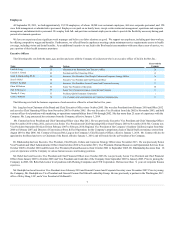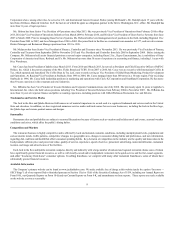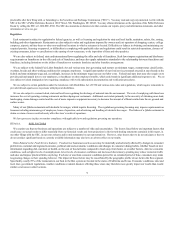Jack In The Box 2013 Annual Report Download - page 11
Download and view the complete annual report
Please find page 11 of the 2013 Jack In The Box annual report below. You can navigate through the pages in the report by either clicking on the pages listed below, or by using the keyword search tool below to find specific information within the annual report.
practicable after their filing with, or furnishing to, the Securities and Exchange Commission (“SEC”). You may read and copy any materials we file with the
SEC at the SEC’s Public Reference Room at 100 F Street, NE, Washington, DC 20549. You may obtain information on the operation of the Public Reference
Room by calling the SEC at 1-800-SEC-0330. The SEC also maintains an Internet site that contains our reports, proxy and information statements, and other
information at www.sec.gov.
Each restaurant is subject to regulation by federal agencies, as well as licensing and regulation by state and local health, sanitation, safety, fire, zoning,
building and other departments. Restaurants are also subject to rules and regulations imposed by owners and (or) operators of shopping centers, college
campuses, airports, military bases or other non-traditional locations in which a restaurant is located. Difficulties or failures in obtaining and maintaining any
required permits, licensing or approval, or difficulties in complying with applicable rules and regulations could result in restricted operations, closures of
existing restaurants, delays or cancellations in the opening of new restaurants, or the imposition of fines and other penalties.
We are also subject to federal, state and international laws regulating the offer and sale of franchises. Such laws impose registration and disclosure
requirements on franchisors in the offer and sale of franchises, and may also apply substantive standards to the relationship between franchisor and
franchisee, including limitations on the ability of franchisors to terminate franchises and alter franchise arrangements.
We are subject to the federal Fair Labor Standards Act and various state laws governing such matters as minimum wages, exempt status classification,
overtime, breaks and other working conditions for company employees. A significant number of our food service personnel are paid at rates based on the
federal and state minimum wage and, accordingly, increases in the minimum wage increase our labor costs. Federal and state laws may also require us to
provide paid and unpaid leave to our employees, or healthcare or other employee benefits, which could result in significant additional expense to us. We are
also subject to federal immigration laws requiring compliance with work authorization documentation and verification procedures.
We are subject to certain guidelines under the Americans with Disabilities Act of 1990 and various state codes and regulations, which require restaurants to
provide full and equal access to persons with physical disabilities.
We are also subject to various federal, state and local laws regulating the discharge of materials into the environment. The cost of complying with these laws
increases the cost of operating existing restaurants and developing new restaurants. Additional costs relate primarily to the necessity of obtaining more land,
landscaping, storm drainage control and the cost of more expensive equipment necessary to decrease the amount of effluent emitted into the air, ground and
surface waters.
Many of our Qdoba restaurants sell alcoholic beverages, which require licensing. The regulations governing licensing may impose requirements on
licensees including minimum age of employees, hours of operation, and advertising and handling of alcoholic beverages. The failure of a Qdoba restaurant to
obtain or retain a license could adversely affect the store’s results of operations.
We have processes in place to monitor compliance with applicable laws and regulations governing our operations.
ITEM 1A. RISK FACTORS
We caution you that our business and operations are subject to a number of risks and uncertainties. The factors listed below are important factors that
could cause our actual results to differ materially from our historical results and from projections in the forward-looking statements contained in this report, in
our other filings with the SEC, in our news releases and in oral statements by our representatives. However, other factors that we do not anticipate or that we
do not consider significant based on currently available information may also have an adverse effect on our results.
Risks Related to the Food Service Industry. Food service businesses such as ours may be materially and adversely affected by changes in consumer
preferences, national and regional economic, political and socioeconomic conditions and changes in consumer dining habits, whether based on new
information regarding diet, nutrition or health, on the cost of food at home compared to food away from home, or on other factors. Adverse economic
conditions, such as higher levels of unemployment, lower levels of consumer confidence and decreased discretionary spending may reduce restaurant traffic
and sales and impose practical limits on pricing. If adverse or uncertain economic conditions persist for an extended period of time, consumers may make
long-lasting changes to their spending behavior. The impact of these factors may be exacerbated by the geographic profile of our Jack in the Box segment.
Specifically, nearly 70% of the restaurants in our Jack in the Box system are located in the states of California and Texas. Economic conditions, state and
local laws, government regulations, weather conditions or natural disasters affecting those states may therefore more greatly impact our results than would
similar occurrences in other locations.
9

